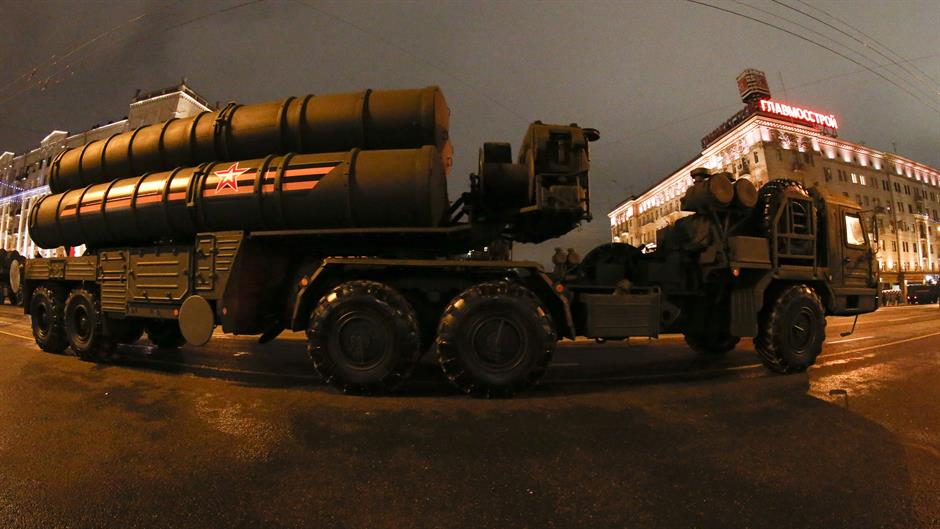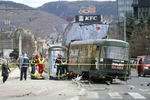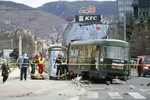
Vice President Mike Pence warned Turkey against going ahead with its planned purchase of the Russian-made S-400 missile system, hours after the Turkish foreign minister said the acquisition was "a done deal."
"We've also made it clear that we'll not stand idly by while NATO allies purchase weapons from our adversaries, weapons that threaten the very cohesion of this alliance," Pence said Wednesday while addressing the "NATO Engages" summit in Washington, DC.
"Turkey's purchase of a $2.5 billion S-400 anti-aircraft missile system from Russia poses great danger to NATO and to the strength of this alliance," he added, saying that Turkey could face consequences for its action.
But speaking at the same event just hours earlier, Turkey's Foreign Minister Mevlüt Çavuşoğlu called Ankara's acquisition of the Russian system "a done deal."
"S-400 deal is a done deal and we will not step back from this," Çavuşoğlu said.
US officials have long warned Turkey that it would not be allowed to acquire the F-35 stealth jet if it goes ahead with the missile system purchase.
The US believes that the Russian-system is incompatible with the F-35 jet, saying that Moscow could use it to gather intelligence on the aircraft.
"To me the incompatibility is that you have an S-400 in close proximity and an S-400 likely to have Russians connected to it," Gen. Curtis Scaparrotti, the head of US European Command, told a small group of reporters at the Pentagon Tuesday.
"It just gives them greater opportunity to analyze the aircraft and its capabilities," he added.
On Monday the Pentagon announced it would halt all F-35 equipment transfers to Turkey unless Ankara irrevocably abandoned plans to acquire the S-400 system.
"Turkey must choose. Does it want to remain a critical partner of the most successful military alliance in the history of the world? Or does it want to risk the security of that partnership by making reckless decisions that undermine our alliance?" Pence said Wednesday.
Sharp Turkish response
His comments drew a sharp response from his Turkish counterpart who issued an ultimatum of his own, demanding the US end its support for Kurdish groups in Syria who have fought ISIS.
"The United States must choose. Does it want to remain Turkey's ally or risk our friendship by joining forces with terrorists to undermine its NATO ally's defense against its enemies?"
Turkey's Vice President Fuat Oktay wrote on Twitter. Turkey sees Kurdish groups in Syria as linked to the Kurdish separatist group PKK, which the US and the European Union consider to be a terrorist group.
However, US and Syrian Kurdish officials have denied such links. If the US were to block Turkey from receiving the jets over the S-400 issue, not only would Turkey lose out on acquiring 100 fifth generation aircraft, Turkish companies, which have been involved in the plane's development, would also lose out on significant business opportunities.
"Turkey risks expulsion from the joint F-35 program, which will harm not just Turkey's defense capacity, but it may cripple many of the Turkish component manufacturers that supply that program," Pence said.
"They're part of the supply chain, it's not a small economic decision for them in that regard," Scaparrotti said.
"F-35 is a comprehensive program and Turkey is a part of this and we have been producing many parts of this F-35 jets, and we have already paid $1.2 billion and another $2.3 billion is on the way and we have actually fulfilled all our obligations as one of the countries which is in the program," Çavuşoğlu said.
Çavuşoğlu added that President Donald Trump had "promised that he will do his best to resolve this issue," warning that if the F-35 transfer is blocked it "it will have a definitely very negative impact on our bilateral relations which we do not prefer."
Asked if he thought Turkey could change the Trump administration's mind with regards to the F-35, he said:
"Of course, we are working on it and different statements are coming from different institutions in the United States as well. As in many other areas like withdrawal of the United States, the decision to withdraw from Syria and the other issues. So different and contradicting statements are coming but overall we agreed to continue working on this issue as well and we will be working."
Çavuşoğlu sought to downplay any risks associated with having the Russian missile system in close proximity to the F-35, saying "it will not be integrated into NATO system, we made it very clear that this system will not see any NATO system including F-35s."
The Turkish foreign minister said Turkey has proposed that the US establish a "technical working group to make sure that this system will not be a threat neither to F-35s nor to NATO systems."
Despite the comments from Turkish officials saying the S-400 purchase was a done deal, senior US military officials said this week that they believed that Turkey may not go through with it and acquire a US-supplied Patriot missile defense system instead.
"Although they have said, even (Turkish President) Erdogan has said the S-400 is a done deal, I don't personally think it's a done deal yet," Scaparrotti said.
"We haven't given up on trying to work our way through this. We've made what we think is a very good offer for the Patriot to provide for the air defense capabilities of Turkey," Chairman of the Joint Chiefs of Staff Gen. Joseph Dunford said Tuesday during an event to honor South Korea's Defense Minister.
"The S-400 and the F35, we've made it clear that those are incompatible systems but we're still working our way through that and hope we can come up with an arrangement with Turkey, so we haven't given up yet is the bottom line," Dunford added.
Kakvo je tvoje mišljenje o ovome?
Učestvuj u diskusiji ili pročitaj komentare





 Srbija
Srbija
 Hrvatska
Hrvatska
 Slovenija
Slovenija



























































